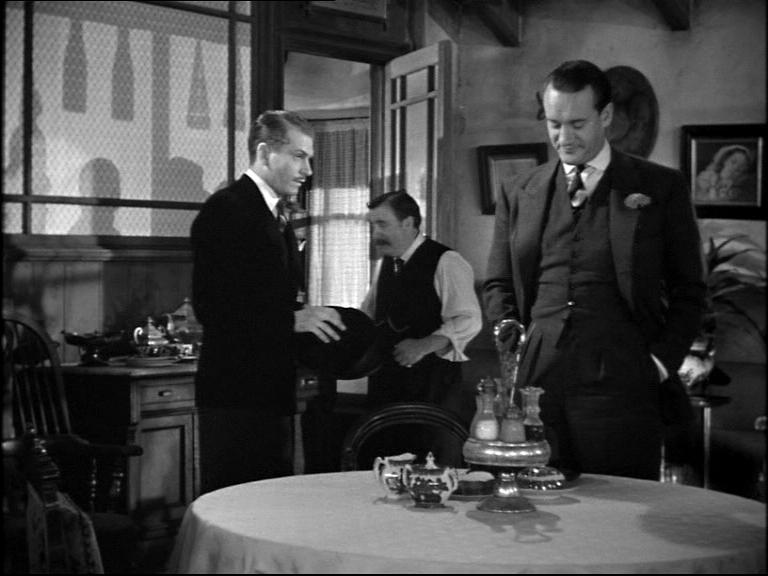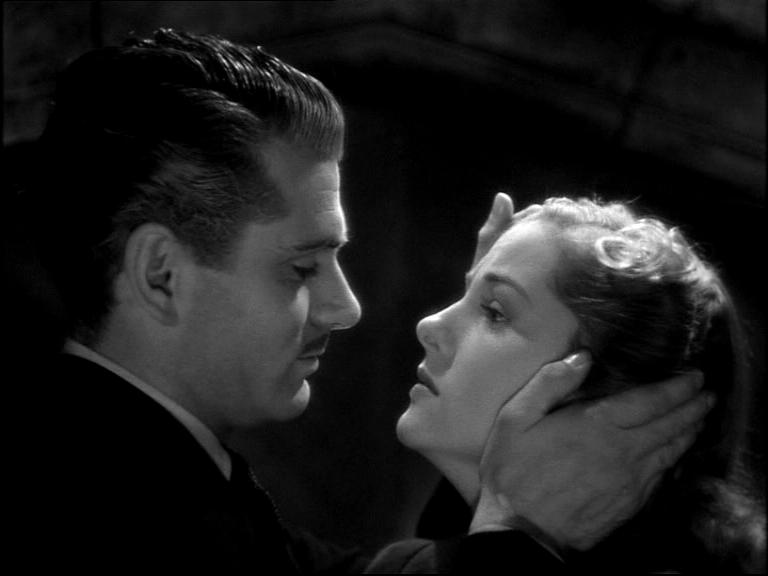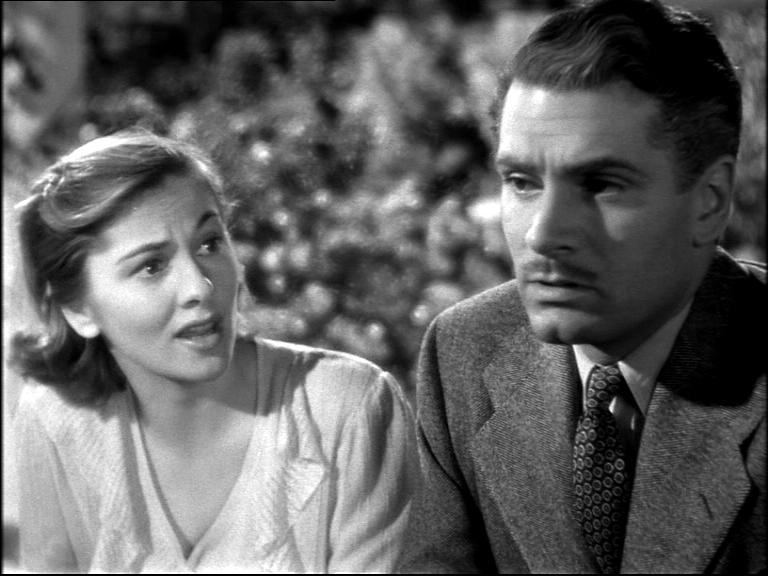"Rebecca" begins with images of a lush wilderness - mist blowing across the ground, sunlight broken by branches and leaves. The shafts of light pierce across the screen, and there's a lovely contrast - the thick tree trunks are so dark that they seem more shadow than anything else. The credits finally close with the words, "Directed by Alfred Hitchcock." Ah.
Then we hear a woman's voice. It's high-pitched, but rather stately.
"Last night, I dreamt I went to Manderley again..."She intones these words - like a spell, like chant. She continues, describing exactly what the camera shows: rolling through metal bars, the screen tracks an over-grown forest road up to a massive mansion. The castle-like structure, of a size with St. Patrick's Cathedral, is ominously imposing by moonlight. She goes on...
"I looked upon a desolate shell, with no whisper of a past about its staring walls. We can never go back to Manderley again... But sometimes - in my dreams - I do go back; to the strange days of my life, which began for me in the south of France."Jane Austen, anyone? The screen fades out completely, to open with waves on a cliff. A man stands at the very edge, staring darkly at the drop ahead. He takes a half-step forward - and our narrator's voice gives a shout. Because they're both English, he pretends she simply annoyed him, then tells her to leave. She's embarrassed, and half-explains before letting him insist on his lie.
Old trailers sure could be cheesy; this one gives away far too much, tho...
All of which leads to an awkward high society meeting in a Monte Carlo parlor. Edith Van Harper, a middle-aged socialite, is complaining about everything as she notices and remembers Maxim de Winter (Laurence Olivier), a famous uber-gentleman. Edith's young assistant (Joan Fontaine) is wide-eyed in shock - the man she stopped at the cliff was Maxim! Since the younger woman's part is never named, I'll just call her "Selene."
The two social peers banter for a spell, until Maxim makes an abrupt exit. Too abrupt, really; he "nearly" became rude. Of course, the older woman blames it on her aide - before mentioning Maxim's long grief over his wife's death...
Yet fate conspires to pair de Winter with Selene. A chance meal quickly leads to an outing by the shore. The girl is open, happy, and shy (but a bit cheeky). The rosy glow on Selene's lovely face only breaks when Maxim is suddenly formal, forceful, or distant. The specter of his wife, it seems, may pop up at any time...
Edith's timely cold creates the perfect opportunity for romance to brew. Selene's eagerness for life brushes against his half-healed wounds, but the older man is clearly taken with her. As their courtship blossoms into a marriage proposal, the frequent jolts of negativity are what create Hitchcock's classic tension: What exactly happened to the first Ms. de Winter? Will the tragic past ruin a happy future?
This classic gothic story was Alfred's first American production. Released in 1940, "Rebecca" got 11 Oscars nods, and won for Best Picture and Best Cinematography (David O. Selnick and George Barnes received the statues). It is a fairly neat adaptation of Daphne du Maurier's popular novel; the book "Rebecca" is often compared to "Jane Eyre," so you can imagine it could have turned out a total mess.
These sudden shifts are strongly reflected in the score. The music is almost always quite delicate, but it is so playful, so frequently! Then why do these ominous overtures keep re-appearing?
In part, it's because the soundtrack is quick to reflect the feelings and worries of the characters; almost a little too quick, for my taste... It makes sense, in the end - the story itself doesn't offer much dramatic tension until 1/4 of the way through; the music has to do the job of keeping certain undercurrents alive so they can play out effectively later...
The contrast between light and dark, of course, is exactly where the movie began. Those opening shots of mists and shadowed trees are a good indication of what's to come. And the regular reinforcement of the theme is part of what makes "Rebecca" such a solid picture: Negative and positive overtake each other, stumbling into each other as the characters try to live their lives.
Watch those opening credits and see what I mean.
Some viewers might be turned off by the constant injection of British Upper-Crust formality. Maxim, of course, has all the trappings of his background, both good and bad. Oh god, his home has a proper name! The constant threat of hearing "but a young lady of your station must never..." gets heavy-handed - it's thrust into part of most every scene. The actors help everything along, though.
Olivier is extremely steady in his Mr. Darcy-esque role. He shifts strongly from anguished to happy, from open to selfish and utterly contained. He nicely conveys a conflicted man, a widower for whom new love is (at least) a little dangerous. Joan Fontaine is perfect as the simple youngster thrown into a complicated situation; if you find any problems with her performance, just look at her eyes and face when she's suddenly embarrassed, or in love.
 |
| Shadows are a constant. |
"Rebecca" is a peculiar kind of movie; you have to go into it with the right expectations. It's called a "psychological/dramatic thriller," yet the suspense is very indistinct. This might be appropriate, for a story about people that are in some way haunted. But when you can only point to some tense conversation between people, the occasional harsh word... this isn't "Notorious," not by a mile.
Keep in mind, I've only described the first 40 minutes or so. As this flick proceeds, lovely images and haunting, dream-like music should pull you into the tale. The movie's true trick is in turning the memory (and repercussions) of one woman's life into a "feeling" that pervades the whole piece, and everyone in it. It's a slow mystery that seems like a differently-obsessed version of "Vertigo."
Dead plants are never a good sign.
What it boils down to is you can't go into this expecting "North by Northwest." This is even more true, because watching this "thriller feature" can feel more like listening to a radio play of "Wuthering Heights." So long as you know what you're getting, I think you'll find "Rebecca" to be a pleasant and interesting story. There's always something to enjoy about this movie - if any one scene doesn't quite engage you, you might notice the great cinematography or the score. Well done, Hitch!
 |
You'll never doubt that the camerawork deserved an Oscar. |
That's how I came to watch and review "Rebecca." I had never seen it before, and I might not have seen it for a long time if not for this simple and inventive idea. I'm always happy for the chance to watch a new movie by the Master of Suspense. This is my first time, though, helping out someone who shares my love of writing about film; also, my first time contribution to such a project. I'm thankful that 2010 offered one last opportunity to expand my horizons a little, and that 2011 followed through smoothly.



This is the best kind of horror movie. It's not about the supernatural, it's about how we haunt ourselves.
ReplyDeleteI appreciated your note that, while a good movie, it's not Hitchcock's best. But that's like saying that milk chocolate isn't the best chocolate. It's still chocolate!